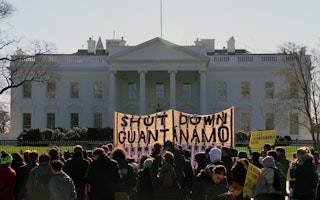Why Europe Must Own Up to Its Participation in CIA Torture
By Natacha Kazatchkine

In December 2014, the report by the U.S. Senate Select Committee on Intelligence officially confirmed the extent of the CIA’s classified program of detention and interrogation of terrorist suspects. But the United States is not the only state complicit in what President Obama publicly acknowledged as “torture.”
Nearly two years before the Senate report was released, the Open Society Foundations had published Globalizing Torture, a comprehensive account of the global system of extraordinary rendition operations and secret detention. The report detailed the cases of 136 known victims, and listed 54 foreign governments that participated in these operations—many of them in Europe.
Over a dozen European Union member states are suspected of having taken part in illegal CIA operations in Europe—from allowing the use of their airspace and airports to transfer prisoners, to secretly detaining people on their soil. Yet not one of them has completed a full and transparent inquiry or brought those responsible to justice.
The European Parliament has been the only EU body to consistently denounce and document the abuse committed with the complicity of European governments. In contrast to the striking silence of the other two institutions of the European Union—namely the European Commission and the Council of Europe—the parliament adopted a resolution in February 2015 that paid tribute to the U.S. Senate for exposing the truth about torture and secret detention of hundreds of suspected terrorists by the CIA.
Most importantly, it reaffirmed the need for the truth about the involvement of European states in this egregious abuse of human rights, and the collective responsibility of the European Union to support accountability.
Leading by example, the parliament committed resources to scrutinize whether its recommendations were followed. On October 13, the public hearing on the investigations into European states’ complicity in the torture, rendition, and secret detention program will do exactly that. It follows a delegation of members of the European Parliament to Romania at the end of September to inquire about national investigations into the CIA secret detention center in Bucharest. A report of the visit will be presented at the hearing, though we already know that the delegation was denied access to the detention site.
This series of initiatives by the parliament is both necessary and timely. It now needs to be a catalyst for real accountability measures against those in Europe who broke international law.
This momentum is already building in the European justice system. In a historic ruling against Poland in July 2014, the European Court of Human Rights became the first ever court to hold an EU country accountable for colluding with the CIA secret detention program. The court found that Poland had hosted a secret CIA prison between 2002 and 2003, where detainees were secretly held and tortured.
The Open Society Justice Initiative successfully litigated the case on behalf of Abd al-Rahim al-Nashiri (al-Nashiri v. Poland) and also represents him in the case currently pending before the European Court against Romania (al-Nashiri v. Romania). On October 13, the European Parliament will hear expert testimony about the violations that took place, in the greatest secrecy, right on the EU’s doorstep.
In addition to Poland and Romania, the European Court of Human Rights is also scrutinizing Lithuania for having hosted a secret CIA detention center where another victim of secret detention in Poland, Abu Zubaydah, claims he was tortured. But neither of these two plaintiffs—Abu Zubaydah and Abd al-Rahim al-Nashiri—will be at the hearing to testify to their ordeal. Both men continue to languish in the Guantánamo Bay detention facility—Abu Zubaydah without charge, and al-Nashiri facing the prospect of the death penalty after an unfair trial before the Guantánamo military commissions.
The U.S. Senate report set the milestone for accountability in Europe. By acknowledging that one of the world’s greatest powers—the United States—committed torture, the report commands Europe to do the same. Despite heavy redactions, its 500-plus page executive summary brings to light detailed information that corroborates and adds to the evidence gathered over the years on European involvement in the CIA detention program.
Member states have an obligation under international law to effectively investigate the allegations of torture and enforced disappearances that they facilitated on European soil. The European Parliament must give itself a clear mandate and the necessary resources to pursue its work in support of this objective.

Natacha Kazatchkine is head of the EU internal policy team for the Open Society Europe and Eurasia Program.


